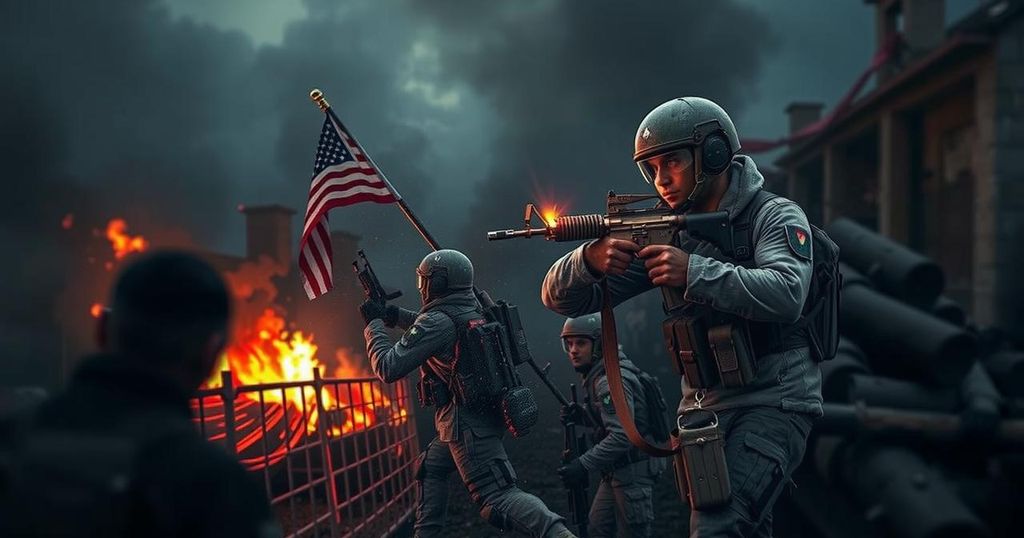Syrian Rebels Capture Aleppo: A Shift in Power Dynamics Amidst Geopolitical Conflicts
A recent surprise offensive by Syrian rebels has seen the capture of Aleppo, revealing vulnerabilities in Assad’s regime due to decreased Russian military support and weakened Iranian proxies. The offensive highlights a shifting balance of power influenced by ongoing conflicts in Ukraine and Lebanon, suggesting that the Syrian conflict is far from resolution, with potential for sustained violence.
The recent unexpected offensive by Syrian rebels has captured Aleppo, reflecting a significant shift in the ongoing Syrian conflict. This offensive, largely attributed to Syrian rebel forces in the northwestern region, indicates a substantial alteration in power dynamics, influenced notably by the current military engagements in Ukraine and Lebanon. Aleppo, once the epicenter of intense fighting between 2012 and 2016, was proactively retaken by rebel groups due to the weakened position of President Bashar al-Assad’s government, previously bolstered by Russian military support.
Following a ceasefire in March 2020 and changing geopolitical circumstances, government forces faced vulnerabilities that allowed rebels to gain the upper hand. The support that Assad once relied upon from Russia has diminished, as Moscow reallocates military resources toward its conflict in Ukraine. The withdrawal of advanced missile systems and a notable decline in operational capabilities signifies Russia’s reduced influence in the Syrian theater, which historically had facilitated Assad’s military objectives.
Furthermore, Israeli airstrikes against Iranian proxy forces in Syria have significantly weakened the Assad regime’s military readiness. As Iranian proxies have suffered losses due to sustained Israeli strikes, there has been a restrained Iranian response, indicating a possible hesitance to take aggressive action that may provoke further Israeli retaliation.
Despite the initial success of the HTS offensive, experts caution that the underlying conflict remains unsettled. HTS’s strategic timing appears effective, yet its rapid advances reveal a complex battlefield environment still rife with challenges for Assad’s regime, stirring fears of prolonged violence in the region.
The Syrian conflict has been ongoing since 2011, marked by various factions vying for power amidst a backdrop of international involvement. The region of Aleppo, a significant battleground, witnessed devastating conflicts and a shift in control largely favoring the Assad regime with Russian support until recent events unveiled vulnerabilities in that position. The Idlib province, where HTS operates, became a focal point after the fall of Aleppo in 2016, with Turkey intervening to support opposition groups. Recent changes in external support for these factions have led to escalated confrontations, highlighting an evolving dynamics influenced by the current geopolitical climate, including conflicts in Ukraine and the Israeli-Iranian tensions. The historical context of the Syrian civil war, allied to the diminishing military backing from Russia and continuous pressure from Israeli operations against Iranian interests in Syria, forms the backdrop against which this new offensive and its implications must be considered. Additionally, the tactical decisions made by HTS amidst the shifting geopolitical circumstances underscore a recalibration of strategies on the ground.
The recent takeover of Aleppo by Syrian rebels signifies a dramatic escalation in the long-standing conflict, catalyzed by shifts in military support dynamics, particularly influenced by Russian involvement in Ukraine and the weakening of Iranian proxies. While the initial success of the rebel offensive has highlighted vulnerabilities in Assad’s forces, the broader implications convey a resurgent conflict that is likely to perpetuate instability in the region. Thus, stakeholders should heed the lessons from this pivot in the conflict as it reflects evolving power dynamics rooted in both local military strategies and international geopolitical landscapes.
Original Source: www.theguardian.com




Post Comment